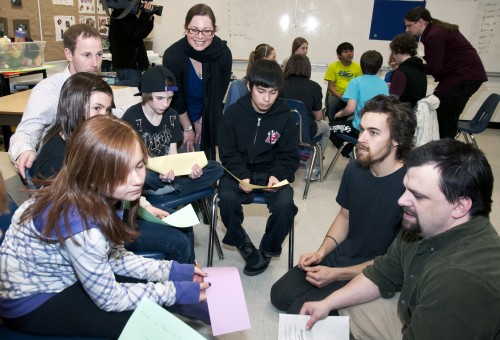Putting philosophy into practice
Children are natural-born philosophers, fearless when it comes to asking the big questions about truth, justice, values, even their own existence. Now, with the help of some U of S students, a group of Saskatoon school children have learned how to pursue their own inquiries through creative and critical discussions; in other words, how to put philosophy into practice.
By Colleen MacPherson The unique partnership came about in a pilot 300-level course, Philosophy in Education: an introduction to philosophy for children, taught by Erin DeLathouwer, who is the learning communities program co-ordinator in the University Learning Centre. The course focused on both the theories and techniques involved in teaching philosophy to children. And for real-world experience, DeLathouwer took her students into Brad Will's Grade 5/6 classroom at Hugh Cairns V.C. School. It was, she said, "a very enriching experience for everyone."
The unique partnership came about in a pilot 300-level course, Philosophy in Education: an introduction to philosophy for children, taught by Erin DeLathouwer, who is the learning communities program co-ordinator in the University Learning Centre. The course focused on both the theories and techniques involved in teaching philosophy to children. And for real-world experience, DeLathouwer took her students into Brad Will's Grade 5/6 classroom at Hugh Cairns V.C. School. It was, she said, "a very enriching experience for everyone."
DeLathouwer explained the role of her students in the classroom was to help the children build skills – how to give and ask for reasons, how to articulate their ideas, how to listen to peers, how to evaluate the ideas of others. "These are tricky things to teach" but Saskatoon Public Schools' division-wide emphasis on inquiry-based learning made for an ideal connection with her class.
The U of S students worked with small groups of children and started off by asking, "what are the things you wonder about?" By then shaping the conversations, "we gave them (the school children) the tools to evaluate other people's ideas and to improve their ability to make judgements based on criteria," said DeLathouwer.
She added one interesting observation of the process was that the school kids were quick to recognize the university students were not teachers but rather students themselves. "I think the kids had a real liberated feeling, that they could say whatever was on their mind because they weren't being marked. They were dealing with people they didn't see as authority figures.
"My students also observed that the kids developed a set of norms in their small groups, their own rules of conduct for their discussions, and they held each other to those rules. That's quite an impressive accomplishment in a short period
of time."
DeLathouwer believes the school students came away from the experience knowing "that it's OK to think about the important questions in their lives," and with critical-thinking skills that will serve them well throughout their education. For the U of S students, "this was an opportunity for the theory and practice of philosophy to come together … (and) for them to understand how philosophy can be practical in the entire system of education."

